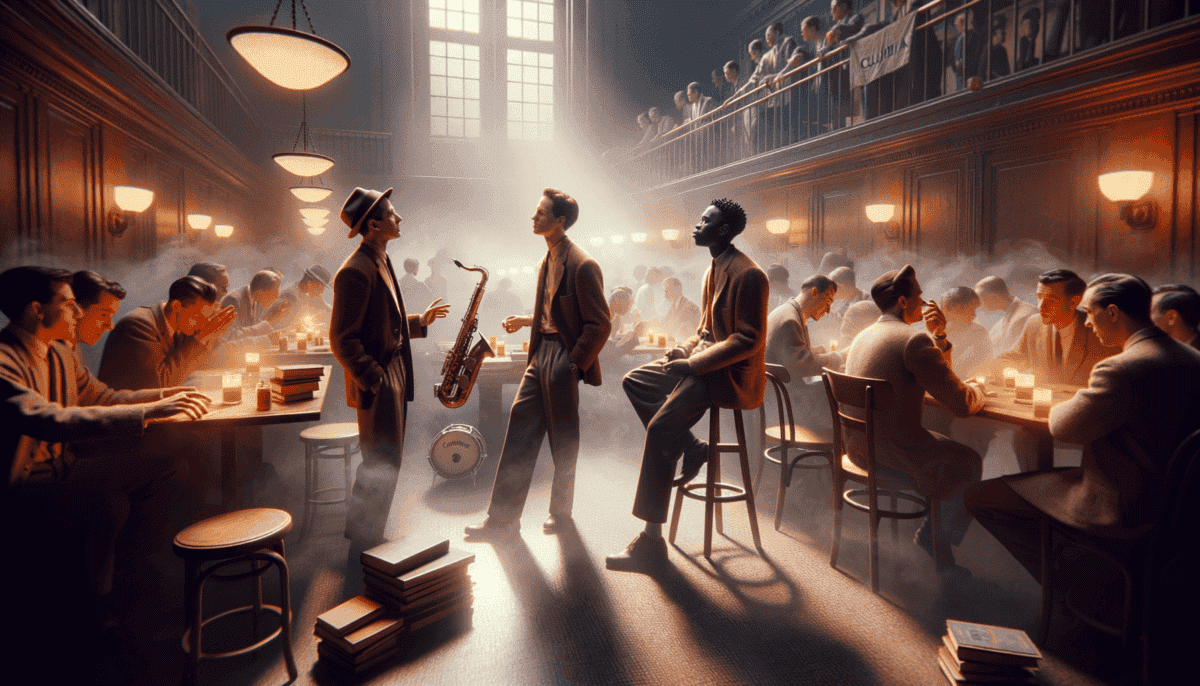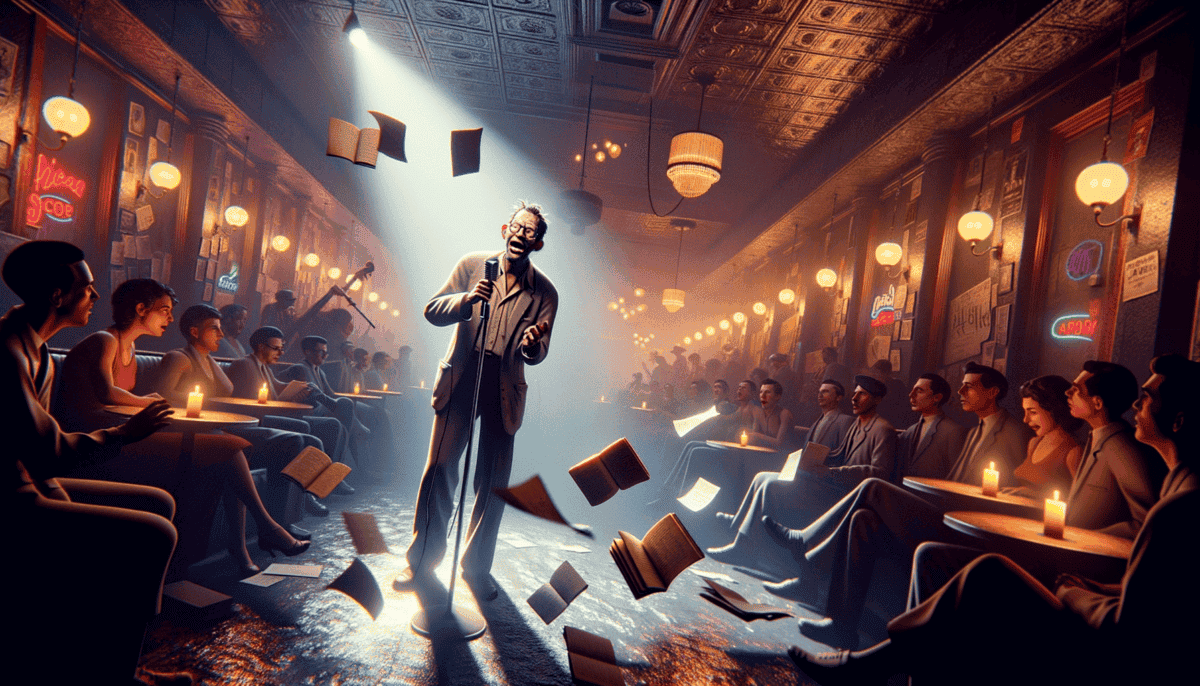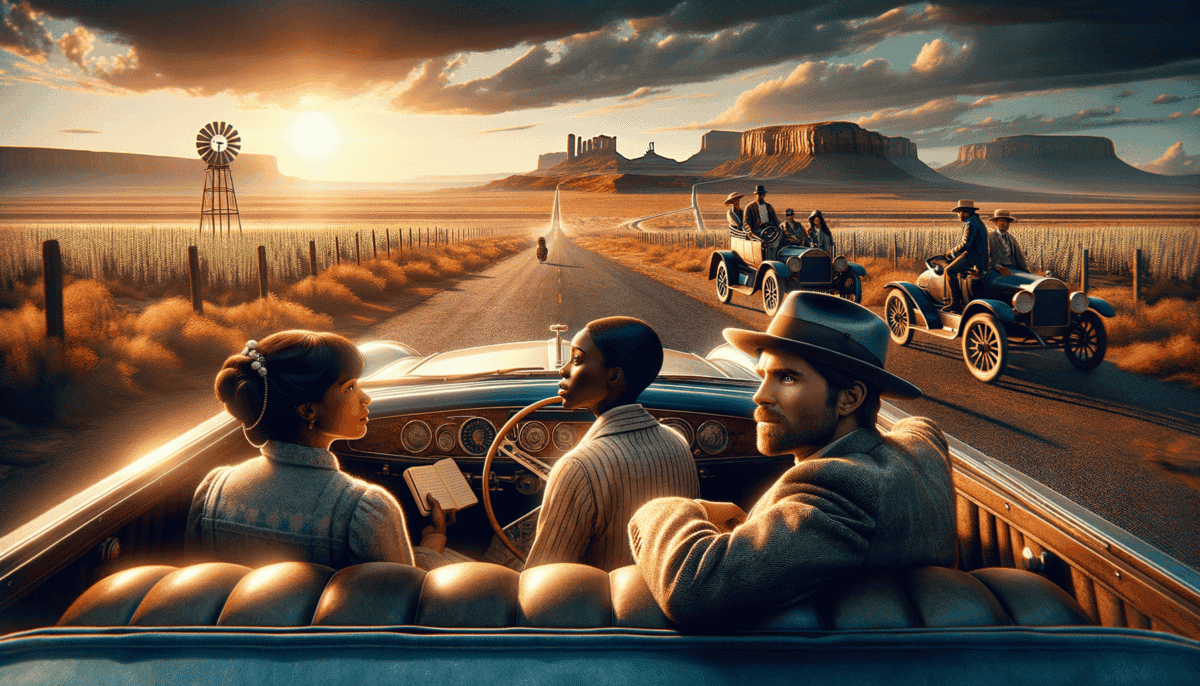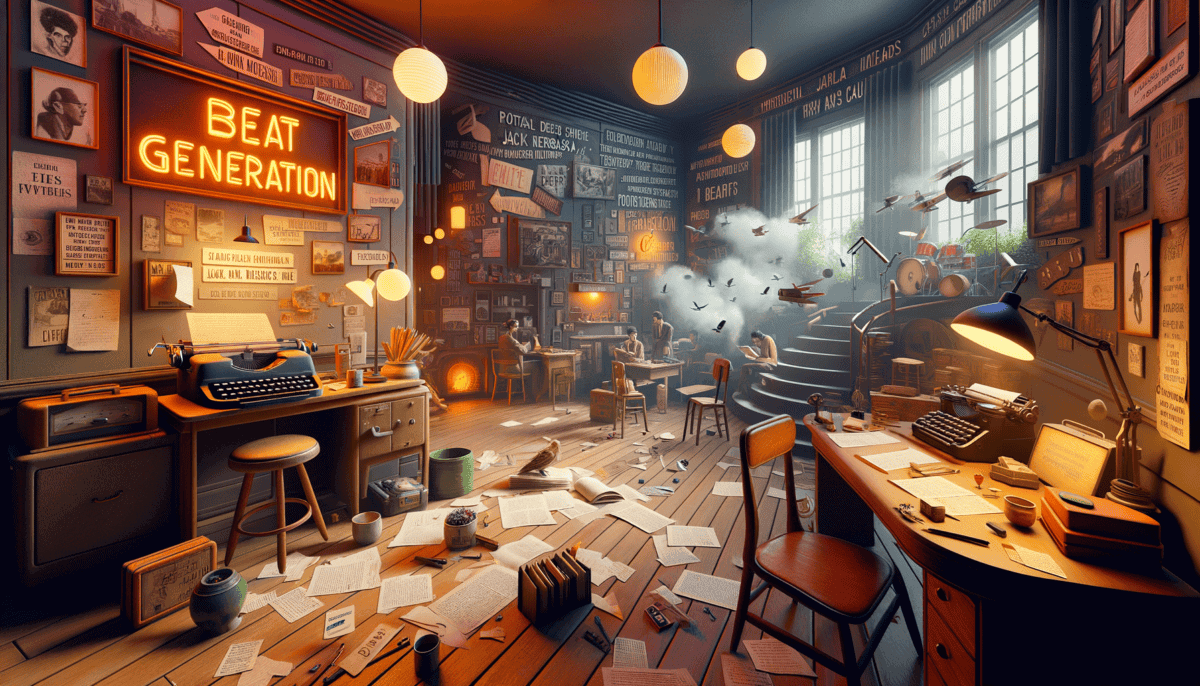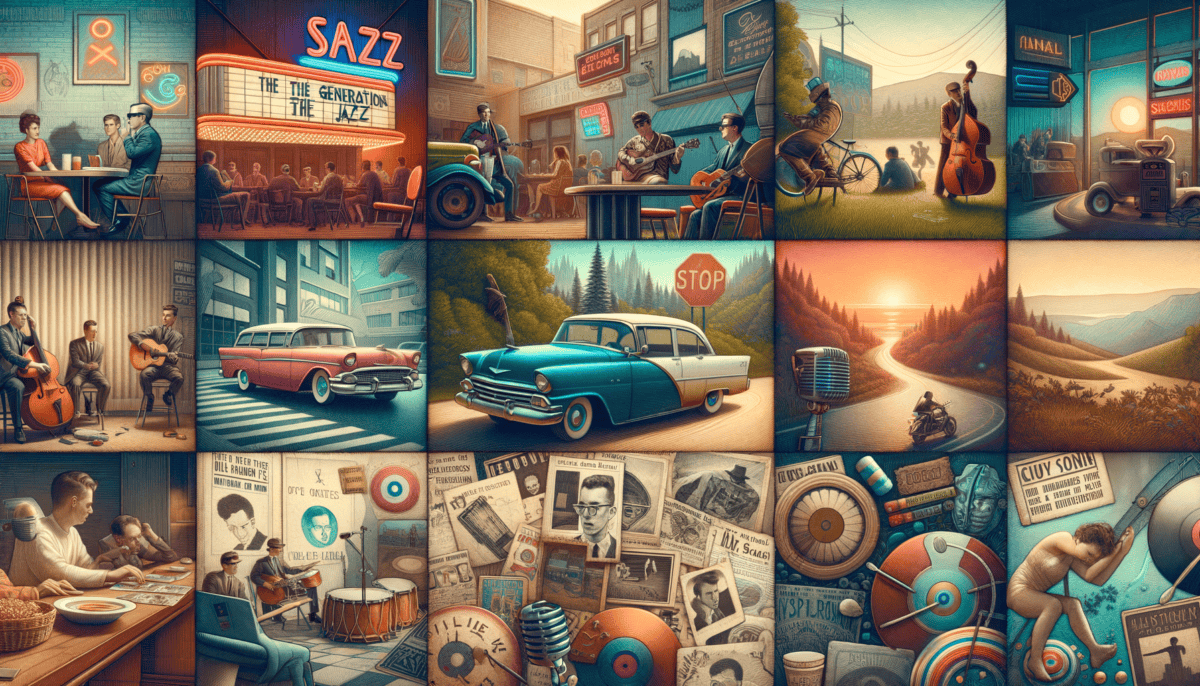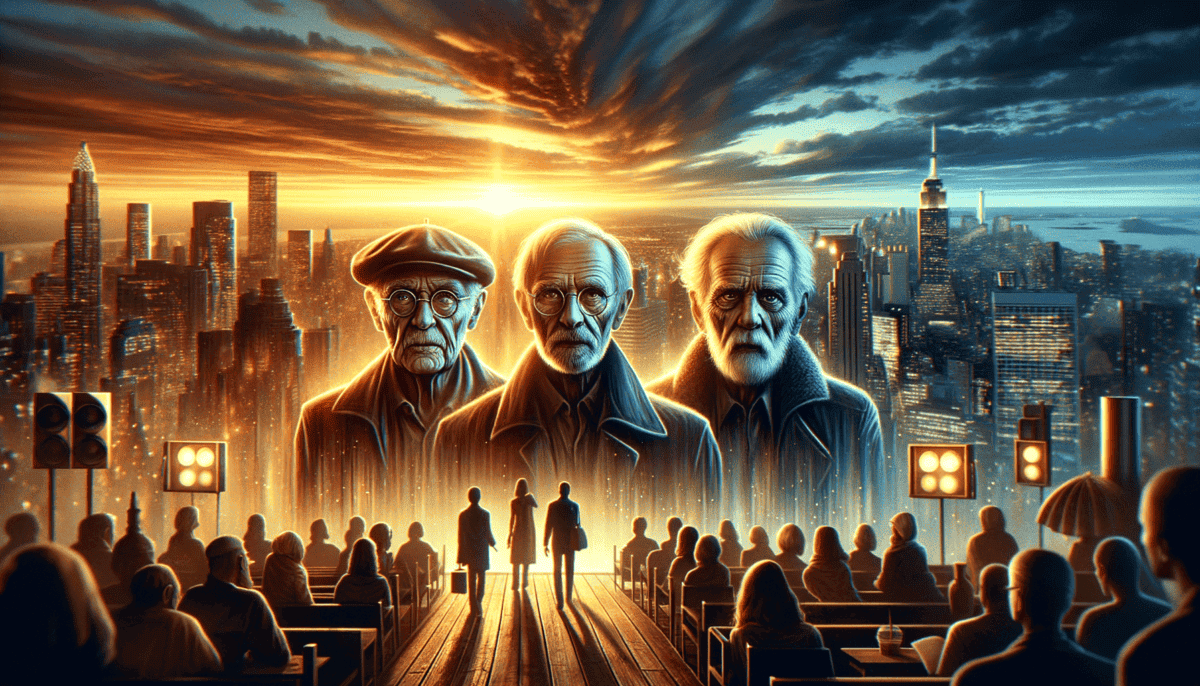The Restless Souls
The streets of New York City buzzed with energy in 1944. The tall buildings reached up to touch the clouds, and the sidewalks were full of people rushing here and there. But in one special place – Columbia University – three young friends were about to change the world. ️
Jack Kerouac sat on the library steps, his notebook open on his lap. He loved to write stories about real life, not fancy made-up tales. His dark hair fell into his eyes as he scribbled words about the city around him.
"Hey Jack!" called a friendly voice. Allen Ginsberg waved as he walked up, his glasses sliding down his nose. Allen wrote poems that made people think differently about the world.
“I want to write something new,” Allen said, sitting next to Jack. “Something that shows how I really feel.”
Their friend William Burroughs joined them, wearing his usual neat suit that made him look older than he was. William had wild ideas that most grown-ups didn't understand.
The three friends talked for hours about their dreams. They didn't want to be like everyone else – working in offices and living quiet lives. They wanted adventure! They wanted to write stories that were different and exciting.
"Let's make our own rules," Jack said, his eyes shining. "We can write about real things, about how we really feel!"
Allen nodded excitedly. "We can say things that other people are afraid to say!"
William smiled his quiet smile. "We can show the world a new way to think."
Together, they made plans. They would write stories and poems that were honest and brave. They would talk about things that other writers didn't talk about. They would be different – and that was okay!
A New Kind of Writing
The friends started meeting every day. Sometimes they sat in coffee shops until late at night. ☕ They wrote and talked and shared their ideas. Other young writers started joining them. Soon, they had a whole group of friends who wanted to write in new ways.
"We're like a beat drum," Jack said one day. "We make our own rhythm!"
That's how they became known as the Beat Generation. They were young writers who wanted to change things. They didn't want to follow the old rules. They wanted to be free to write their own way.
Some people didn't like their new ideas. Some teachers at Columbia University shook their heads. But Jack, Allen, and William didn't care. They knew they were starting something special.
As the sun set over New York City, casting long shadows between the tall buildings, the three friends made a promise to each other. They would keep writing their truth, no matter what anyone said. They would help other young writers be brave too.
"This is just the beginning," Allen said, looking out at the city lights coming on one by one.
Jack wrote faster in his notebook, trying to catch all their dreams on paper. William stood quietly, watching the city that would soon read their words and never be the same.
They were young. They were brave. And they were about to change the way people thought about writing forever.
The city hummed around them, full of possibilities. Their story was just beginning, and it would grow bigger than any of them could imagine. More adventures waited for them – adventures that would shake up the whole world.
AI Human: WRITE CHAPTER 2 OF THE NOVEL
Breaking the Silence
The year was 1955, and Allen Ginsberg couldn’t sleep. Words danced in his head like bright stars. ⭐ He sat at his desk in San Francisco, writing faster than ever before. A new poem was coming to life – one that would shake up the whole world.
“I saw the best minds of my generation…” Allen whispered as he wrote. His pencil flew across the paper.
The poem was called “Howl.” It wasn’t like other poems. It was loud and wild and free, just like the beating of his heart. Allen wrote about real things – about his friends, about the city, about life itself.
“People need to hear this,” Allen said to himself, pushing his glasses up his nose. “They need to know the truth.”
The Big Night
On October 7, 1955, something amazing happened. Allen stood in a small art gallery called Six Gallery. The room was packed with people. Some sat on the floor, others stood against the walls. Jack Kerouac was there too, cheering “GO! GO! GO!” and passing around jugs of wine.
“I’m scared,” Allen told Jack before he started reading.
“Just tell your truth,” Jack said, patting his friend’s shoulder. “That’s all that matters.”
Allen took a deep breath and began to read “Howl.” His voice started soft but grew stronger with each word. The poem was like nothing anyone had ever heard before. It was about freedom and friendship and speaking up when others stay quiet.
Trouble Brewing
But not everyone liked the new poem. Some people thought it was too different, too honest. They didn’t want it in bookstores. They tried to stop people from reading it.
Lawrence Ferlinghetti, who owned a bookstore called City Lights, was brave. He published “Howl” as a little book that people could buy. “Everyone should be able to read this,” he said.
The police didn’t like that. They took the books away and said Lawrence was in trouble for selling them. But Lawrence and Allen didn’t give up. They knew their words were important.
“Words want to be free,” Allen told his friends. “Just like people do.”
Victory for Freedom
There was a big court case. Lots of people came to say why “Howl” was important. They said poetry should be free to talk about real things. ⚖️
The judge agreed! He said “Howl” was art and that art should be free. It was a big win for Allen and all writers who wanted to write in new ways.
After that, more people read “Howl.” Young writers felt braver about writing their own truth. Allen’s friends were so proud of him.
“You did it,” Jack said, hugging his friend. “You showed them all what poetry can be.”
William Burroughs sent a letter saying, “You’ve opened a door that can’t be closed.”
Allen smiled, thinking about all the new poems waiting to be written. The world was changing, one word at a time. More young writers were finding their voices, ready to tell their own stories.
The stars still danced in Allen’s head, but now they danced in other people’s heads too. The silence was broken, and a new kind of poetry was born.
The Open Road
Jack Kerouac sat in the passenger seat of Neal Cassady’s old car. The wind blew through his hair as they zoomed down the big American highway. It was 1947, and the whole country was waiting to be discovered.
“The road is life!” Jack shouted into the wind, while Neal laughed and pressed the gas pedal.
Jack had a small notebook in his pocket. Every time they stopped, he would write about what he saw. The mountains, the deserts, the cities full of lights – everything was going into his story. ✏️
Friends on the Move
“Why do we keep driving?” someone once asked Jack.
“Because,” Jack said, smiling, “out there on the road, we can be free. We can see real America, meet real people.”
They stopped at small diners where tired waitresses served hot coffee. They visited jazz clubs where musicians played music that made their hearts dance. They slept under the stars and woke up to gorgeous sunrises.
Neal drove fast, too fast sometimes. But Jack didn’t mind. Every mile was a new story.
Writing the Big Story
When Jack got back home, he couldn’t stop thinking about the road. He took out a long roll of paper and started typing. He typed and typed for three whole weeks!
“What are you writing?” his mom asked, bringing him coffee.
“I’m writing about America, Mom,” Jack said. “About the real America I saw from the road.”
He called his book “On the Road.” It was about two friends driving across America, looking for something they couldn’t name. It was about freedom and friendship and the joy of moving.
Big Changes
Jack’s book was different from other books. It was wild and free, just like his trips with Neal. Some people didn’t understand it at first. But young people loved it!
“This is how we feel!” they said. “This is what we want to do!”
Soon, lots of young people started taking their own road trips. They wanted to see America like Jack did. They wanted to find their own adventures.
“Look what you started,” Allen Ginsberg told Jack one day. “You made them want to be free.”
The Road Goes On
Jack’s story changed how people thought about travel. It wasn’t just about getting from one place to another anymore. It was about discovering yourself along the way.
“The road is always there,” Jack would tell people. “It’s waiting for anyone who wants to find something new.”
Cars kept zooming down America’s highways. Young people kept looking for adventures. And Jack’s words kept showing them the way, like headlights in the dark.
Sometimes at night, Jack would hear the distant sound of trains and think about all the people out there, driving across America, looking for their own stories to tell. The road was calling them, just like it had called him.
Wild Words and New Ways
William Burroughs sat at his desk, looking at pieces of paper spread everywhere. Some had words from newspapers, others from old books. He picked up his scissors, ready to try something new. ✂️
“Words are alive,” William said to himself. “Let’s see what happens when we set them free.”
A Different Kind of Writer
In his small room in Paris, William worked like a scientist with words. He cut up pages and mixed them up, making new stories appear like magic.
“But William,” his friend Allen said during a visit, “nobody writes like this!”
William smiled. “That’s exactly why I’m doing it. We need new ways to tell the truth.”
Fighting Inner Monsters
Writing wasn’t just fun for William. It helped him fight his own battles. He had been sick from bad medicines, but writing made him stronger.
“Some days are hard,” he told Jack Kerouac in a letter. “But when I write, I feel free.”
Breaking the Rules
Not everyone liked William’s strange new stories. Some people wanted to stop his books from being in stores.
“Your words are too wild,” they said.
“But life is wild,” William answered. “My stories just tell the truth about that.”
His friends stood by him. They knew he was doing something important, even if it was different.
Making New Paths
Other writers started trying William’s cut-up way of writing. Musicians used it to make song words. Artists used it to make pictures.
“See what you started?” Allen told him. “You showed people a new way to make art.”
William kept working in his quiet room. He mixed words from science books with pieces of old poems. He put newspaper headlines next to dream stories. Everything was possible in his world of words.
Words Set Free
Young writers came to visit William. They wanted to learn how to be brave with words like him.
“Don’t be afraid to try new things,” he told them. “Words can dance if you let them.”
His desk stayed messy with cut-up papers. His scissors stayed sharp. And his mind stayed open to new ways of telling stories that nobody had ever thought of before.
Every night, William would look at his work and smile. He had found his own way to be free, one cut-up page at a time. ✨
Waves of Change
The year was 1957, and something big was happening in America. The Beat writers were no longer just friends writing in coffee shops – they were starting to shake up the whole country!
Music in the Air
Young musicians started playing new kinds of songs inspired by the Beats. In smoky jazz clubs, poets would read while bands played.
“The words and music dance together,” Allen Ginsberg said, snapping his fingers to the beat.
Bob Dylan, a young singer, picked up “Howl” and felt his world change. “These poets showed me words could be wild and free,” he said.
Colors of Freedom
Artists started painting differently too. They splashed colors freely on canvas, just like the Beats splashed words on paper.
“We’re all connected,” Jack Kerouac said. “Writers, painters, musicians – we’re all trying to say something new.”
Standing Up Together
The Beats’ brave words gave others courage. People fighting for equal rights started speaking up louder.
“Your stories helped us find our voice,” a young civil rights worker told Allen.
Not Everyone Happy
Some grown-ups didn’t like these changes. They said the Beat writers were causing trouble.
“Their books are dangerous,” some teachers said.
“Books can’t be dangerous,” William Burroughs replied. “They just show us what’s real.”
Growing Bigger
More young people started writing poems and stories the Beat way. Coffee shops became full of readers sharing their words. ☕
“Look what we started,” Jack said to his friends. “It’s like a big wave of new ideas.”
A New Way of Living
The Beats showed people they could live differently. You didn’t have to wear the same clothes or think the same thoughts as everyone else.
Young people started:
- Growing their hair long
- Playing different music
- Writing their own poems
- Traveling to find adventures
- Speaking up for what they believed
More Than Books
The Beat Generation wasn’t just about writing anymore. It was about changing how people thought and lived.
“We wanted to write differently,” Allen said. “But look – we helped people live differently too.”
Their words had started something big, like a stone making ripples in a pond. And those ripples were getting bigger every day.
The next morning, Jack looked out his window at the busy street. “We’re not alone anymore,” he smiled. “There are Beat hearts beating everywhere now.” ✨
Echoes Through Time
The sun rose over Greenwich Village in 1960. The Beat writers sat in their favorite coffee shop, watching young people walk by with books tucked under their arms.
Looking Back
Jack Kerouac smiled at his old friends. “Remember when we were just crazy kids at Columbia?” he asked.
Allen Ginsberg laughed. “Now look – there are thousands of crazy kids just like us!”
William Burroughs nodded. “We opened a door. Now everyone can walk through it.”
New Voices Rising
Young writers everywhere were finding their own voices. They didn’t have to write like their teachers told them anymore. ✍️
“The best words come from your heart,” Jack always said. “Not from rules in a book.”
Big Changes
The Beat Generation helped change many things in America:
- People felt free to be themselves
- Art became more open and wild
- Music grew louder and braver
- Words broke free from old rules
- Young people found their voices
Seeds of Tomorrow
In parks and coffee shops, new groups of young people gathered. They wore bright clothes and played guitars.
“Look,” Allen said. “The seeds we planted are growing into something new!”
Never Ending Story
Years later, their books still spoke to new readers. Each generation found something special in the Beat writers’ words.
“Our words will keep traveling,” Jack said, “like that car in ‘On the Road’ – always moving forward.”
Forever Friends
The three friends had changed. Their hair was grayer now. But their eyes still sparkled with the same fire.
“We did it together,” Allen said softly. “That’s what made it work.”
The Beat Goes On
New writers came to thank them. Musicians wrote songs about them. Artists painted their pictures.
“The beat of our words keeps playing,” William said. “Like a drum that never stops.”
As the sun set over the city, Jack looked at his friends. “We wanted to write our own story,” he smiled. “But we ended up helping everyone write theirs too.”
The Beat Generation had shown that words could change the world. Their spirit lived on in every person who dared to be different, speak up, and follow their dreams. ⭐
And somewhere, in a quiet room or a busy coffee shop, someone is opening one of their books for the first time, ready to catch that same wild spark of freedom that started so many years ago.

